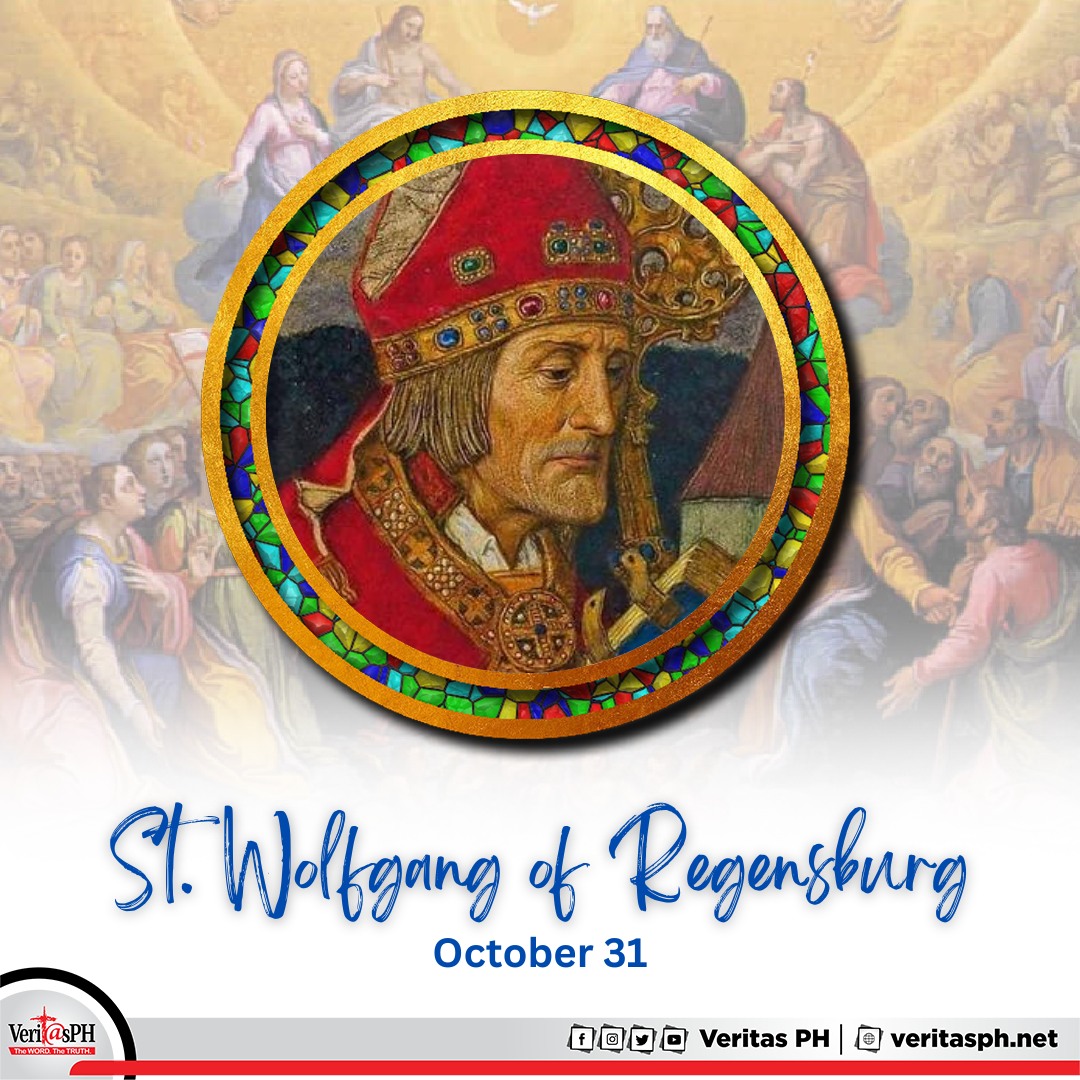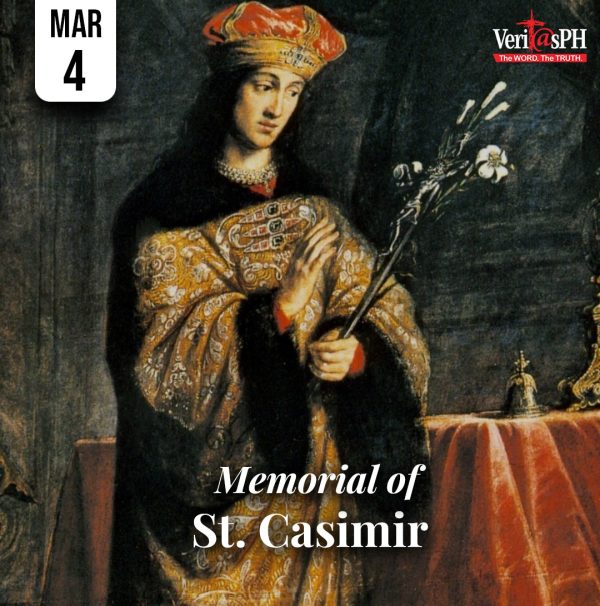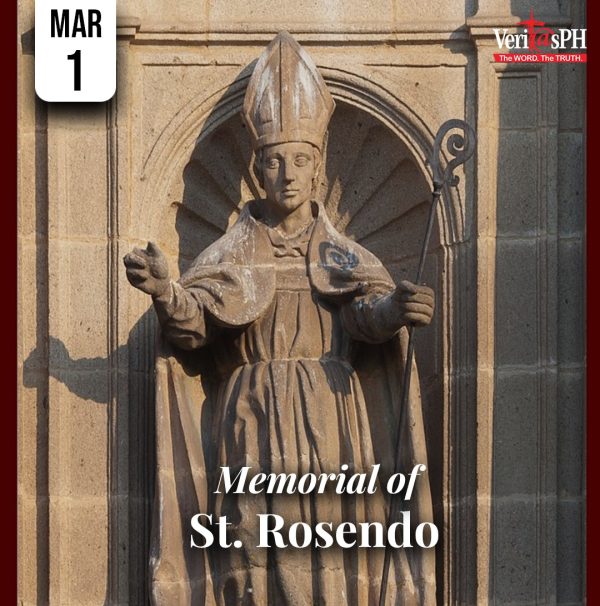294 total views
𝐇𝐨𝐧𝐨𝐫𝐢𝐧𝐠 𝐭𝐡𝐞 𝐒𝐚𝐢𝐧𝐭 𝐨𝐟 𝐭𝐡𝐞 𝐃𝐚𝐲: 𝐀 𝐁𝐞𝐚𝐜𝐨𝐧 𝐨𝐟 𝐅𝐚𝐢𝐭𝐡 𝐚𝐧𝐝 𝐈𝐧𝐬𝐩𝐢𝐫𝐚𝐭𝐢𝐨𝐧
𝐎𝐜𝐭𝐨𝐛𝐞𝐫 𝟕 • 𝐒𝐭. 𝐖𝐨𝐥𝐟𝐠𝐚𝐧𝐠 𝐨𝐟 𝐑𝐞𝐠𝐞𝐧𝐬𝐛𝐮𝐫𝐠
𝐅𝐀𝐂𝐓𝐒 𝐀𝐁𝐎𝐔𝐓 𝐒𝐀𝐈𝐍𝐓
Wolfgang was born in Swabia, Germany, and was educated at a school located at the abbey of Reichenau. There he encountered Henry, a young noble who went on to become Archbishop of Trier. Meanwhile, Wolfgang remained in close contact with the archbishop, teaching in his cathedral school and supporting his efforts to reform the clergy.
At the death of the archbishop, Wolfgang chose to become a Benedictine monk and moved to an abbey in Einsiedeln, now part of Switzerland. Ordained a priest, he was appointed director of the monastery school there. Later he was sent to Hungary as a missionary, though his zeal and good will yielded limited results.
Emperor Otto II appointed him Bishop of Regensburg, near Munich. Wolfgang immediately initiated reform of the clergy and of religious life, preaching with vigor and effectiveness and always demonstrating special concern for the poor. He wore the habit of a monk and lived an austere life.
The draw to monastic life never left him, including the desire for a life of solitude. At one point he left his diocese so that he could devote himself to prayer, but his responsibilities as bishop called him back. In 994, Wolfgang became ill while on a journey; he died in Puppingen near Linz, Austria. He was canonized in 1052. His feast day is celebrated widely in much of central Europe.
𝐏𝐑𝐀𝐘𝐄𝐑
𝘓𝘰𝘳𝘥, 𝘩𝘦𝘭𝘱 𝘶𝘴 𝘵𝘰 𝘧𝘰𝘭𝘭𝘰𝘸 𝘪𝘯 𝘺𝘰𝘶𝘳 𝘧𝘰𝘰𝘵𝘴𝘵𝘦𝘱𝘴 𝘫𝘶𝘴𝘵 𝘢𝘴 𝘺𝘰𝘶𝘳 𝘈𝘱𝘰𝘴𝘵𝘭𝘦𝘴 𝘥𝘪𝘥, 𝘵𝘩𝘢𝘵 𝘸𝘦 𝘮𝘢𝘺 𝘣𝘦 𝘢 𝘨𝘰𝘰𝘥 𝘦𝘹𝘢𝘮𝘱𝘭𝘦 𝘵𝘰 𝘰𝘵𝘩𝘦𝘳𝘴. 𝘎𝘳𝘢𝘯𝘵 𝘶𝘴 𝘵𝘩𝘦 𝘨𝘳𝘢𝘤𝘦𝘴 𝘸𝘦 𝘯𝘦𝘦𝘥 𝘵𝘰 𝘣𝘦 𝘨𝘰𝘰𝘥 𝘥𝘪𝘴𝘤𝘪𝘱𝘭𝘦𝘴 𝘢𝘯𝘥 𝘢𝘭𝘸𝘢𝘺𝘴 𝘭𝘦𝘢𝘥 𝘰𝘶𝘳 𝘧𝘳𝘪𝘦𝘯𝘥𝘴 𝘰𝘯 𝘵𝘩𝘦 𝘱𝘢𝘵𝘩 𝘵𝘰 𝘩𝘰𝘭𝘪𝘯𝘦𝘴𝘴. 𝘚𝘢𝘪𝘯𝘵 𝘞𝘰𝘭𝘧𝘨𝘢𝘯𝘨, 𝘱𝘳𝘢𝘺 𝘧𝘰𝘳 𝘶𝘴.
𝘈𝘮𝘦𝘯.




















